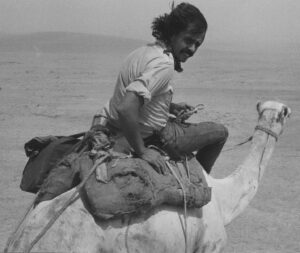
Dan

I was born in New Orleans in 1944; grew up largely in Chicago and the New York City area; married in 1965 while at Hobart College; earned a Masters in Literature at the University at Buffalo in 1968; and lived in Berkeley, Calif.; Warwick, Mass.; and Cambridge, Mass., before the marriage broke up in 1973. Today, I live in Gloucester, Mass., with photographer and former graphic designer Debbie Hird (m. 1995). My daughters—Joanie (b. 1965) and Laura (b. 1968)—live with their families in California and Florida; my newly discovered son, James Collins (b. 1965), lives in Charlotte, North Carolina.
After university, I worked as a carpenter’s apprentice, an art and music librarian, a farm-hand, a house painter, an inner-city science teacher, an alternative-high-school administrator, a book-seller and a copy writer—exploring the social landscape and participating in a range of social and political movements whose common threads were an egalitarian ethos and a commitment to social justice. In 1975, I set out for Africa with a backpack, a notebook, and a burning curiosity about people’s struggles for liberation and a drive to write about them.
I made my way to Addis Ababa via Cairo and Khartoum to observe Ethiopia’s self-described “socialist” revolution, still at that time supported by the United States, but I soon re-focused on the largely unreported struggle for independence in Eritrea, a former Italian colony that Ethiopia had forcibly annexed in the early 1960s only to become bogged down in a brutal counterinsurgency war.
Hitchhiking on a government convoy, I crossed guerrilla lines to reach the besieged Eritrean capital, Asmara, in April 1976. There, I witnessed the assassination of a high-ranking Ethiopian official and its bloody aftermath: the execution of dozens of civilians. My report on this massacre appeared on the front page of The Washington Post.
Next, I traveled to guerrilla-held areas of Eritrea, spending five weeks reporting on the war zone. Over the following five years, I returned frequently, writing for The Post, the New York-based Guardian, the BBC, AP, Reuters and other media, often as the only one covering the conflict. Eritrea has remained a central focus of my work ever since, though I have written on social and political issues elsewhere in Africa, the Middle East, Central America and the Philippines. (For examples on Palestine, Lebanon, South Africa and Nicaragua, scroll through the Selected Articles).
In 1983, after a stint with Oxfam America in Lebanon [see “Lessons from Lebanon 1982-83” on the Articles page], I founded and directed the Boston-based development agency Grassroots International to provide aid to social movements in Eritrea, Lebanon, Palestine, South Africa and other conflict areas and to channel information to the media, policymakers and the public.
In 1990, I left Grassroots to spend a year in the Philippines, while producing a first draft of my book on Eritrea’s independence war, Against All Odds; A chronicle of the Eritrean Revolution (1993). Next came a six-year investigation into post-cold-war social and political movements in Eritrea, South Africa, Palestine and Nicaragua for Rethinking Revolution: New Strategies for Democracy & Social Justice (2002), supported by a grant from the MacArthur Foundation.
After Eritrea went back to war with Ethiopia in 1998, ostensibly over unresolved border issues, I produced a country handbook for Eritrea’s Ministry of Information but clashed with the regime over its increasingly repressive policies and was ousted in 2002. A year later, I published a paper marking my break with the liberation movement, “Enough! A Critique of Eritrea’s Post-Liberation Politics,” which coincided with the publication of a two-volume collection of my articles from mass media and journals—Taking on the Superpowers: Collected Articles on the Eritrean Revolution (1976-1983), Vol. 1 and Building a New Nation: Collected Articles on the Eritrean Revolution (1983-2002), Vol. 2.
From 2002 to 2014, I taught journalism and African politics at Simmons University, during which I transcribed a series of interviews with five high-ranking EPLF dissidents imprisoned for criticizing Eritrea’s president, Isaias Afwerki, that I published as Conversations with Eritrean Political Prisoners (2005). I also took student groups to South Africa every other year to write on human rights and edited two books of their articles—Women to Women: Young Americans in South Africa (2006) and Old Wrongs, New Rights: Student Views of the New South Africa (2008). In 2010, I produced a 2nd edition of the Historical Dictionary of Eritrea, building on the work of California-based historian-turned-artist Tom Killion.
In 2012, with support from Simmons, I began a series of field investigations into Eritrea’s growing refugee outflows. Upon retiring in 2014, I began a six-year consultancy on refugee and peace issues for the Norwegian Ministry of Foreign Affairs that took me to Eritrean camps and communities in 19 countries on five continents. I also founded and directed the Cape Ann Forum—a free public lecture series on international issues—that sponsored over 100 events from 2001 to 2019, and I produced a 3rd edition of the Historical Dictionary of Eritrea (2019).
Based on my extensive field research and a trip to Ethiopia and Sudan in March/April 2021, I produced a new edition of Against All Odds with a lengthy update and reappraisal of Eritrea and its political leadership up to its intervention in the Ethiopian civil war. I continue my research and writing as a research affiliate at Boston University’s African Studies Center and am working on a new book: Eritrean Journeys—Theirs and Mine.
Updated August 2024.
